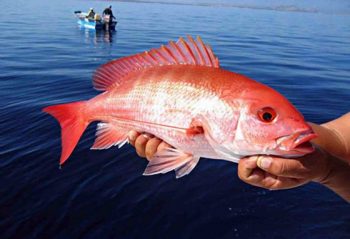The ‘Modern Fish Act’ could roll back many of the conservation gains we’ve made through the Magnuson-Stevens Act’s science-based approach to fisheries management, which has led to the successful rebuilding of many of our fish stocks.

Red snapper, photo via NOAA
On April 6, 2017, Representatives Garret Graves (R-La.), Gene Green (D-Texas), Daniel Webster (R-Fla.) and Rob Wittman (R-Va.), introduced the “Modernizing Recreational Fisheries Management Act of 2017” (Modern Fish Act).
The co-sponsors’ of this bill attempt to address some of the concerns of our recreational fishing community, such as obtaining more accurate and up-to-date catch accounting in both the recreational and commercial sectors. Unfortunately, H.R. 2023, the Modernizing Recreational Fisheries Management Act of 2017 falls short of finding workable solutions to those issues and many others that affect the livelihoods of our recreational and commercial fishermen and the communities that depend on this public resource.
The Magnuson-Stevens Act has made advances in the path toward more productive fisheries possible, and we are looking to work with the bill’s sponsors and all of Congress through the reauthorization of the Magnuson-Stevens Act to continue that progress.
Why we don’t support this legislation
The Modern Fish Act inserts too much uncertainty into the fisheries management process by adversely changing catch limits and how they are applied, muddies the waters between state and federal management, and allows political and economic considerations to override science in management decisions. H.R. 2023 would undo many of the conservation gains made over the past 10+ years in ending overfishing and rebuilding depleted stocks by removing or loosening the requirement of setting scientifically-based catch limits.
- Annual Catch Limits (ACLs) would not be required for stocks where fishing rates are below fishing targets, the very management tools that have ended overfishing in so many fisheries across the U.S. Removing catch limits removes any semblance of conservation and protections against returning to the days of widespread overfishing.
The bill would stifle entrepreneurial fishermen that want to pilot new, innovative and creative tools and programs that could explore more small business-friendly approaches to fisheries management.
- The bill puts undue burdens on the approval process for issuing any Exempted Fishing Permit (EFP).
The bill provides new authority to Regional Fishery Management Councils to use “alternative fishery management measures” in recreational fisheries, including alternatives to catch limits.
- Councils would effectively be exempt from using catch limits in recreational fisheries. While using so-called alternative measures may sound appealing, there is little evidence to support their use as an effective fisheries management approach. Coercing Councils to use alternatives to proven catch limits in recreational fisheries is fraught with peril.
This bill prohibits certain proven commercial fishery management tools, even if fishermen want them.
- The bill puts a moratorium on any new Limited Access Privilege Programs (LAPPs), sometimes called “catch shares,” in mixed-use fisheries under the jurisdiction of the South Atlantic and Gulf of Mexico Fishery Management Councils. Many fishermen support using LAPPs and believe it is the very management tool that rebuilt the Gulf red snapper fishery. There is no reason for a moratorium on LAPPs and calls into question the need.
The bill attempts to formalize the inclusion of information from third-parties into fisheries management decisions, particularly from the recreational sector.
- While laudable and something the Network agrees to conceptually, this bill unfortunately lacks any requirement for the scientific standards and rigor needed for science used in stock assessments and fish surveys. This provision would ultimately do more harm than good, and should be improved with more attention to those challenges.
You can read and download our statement regarding H.R. 2023.

